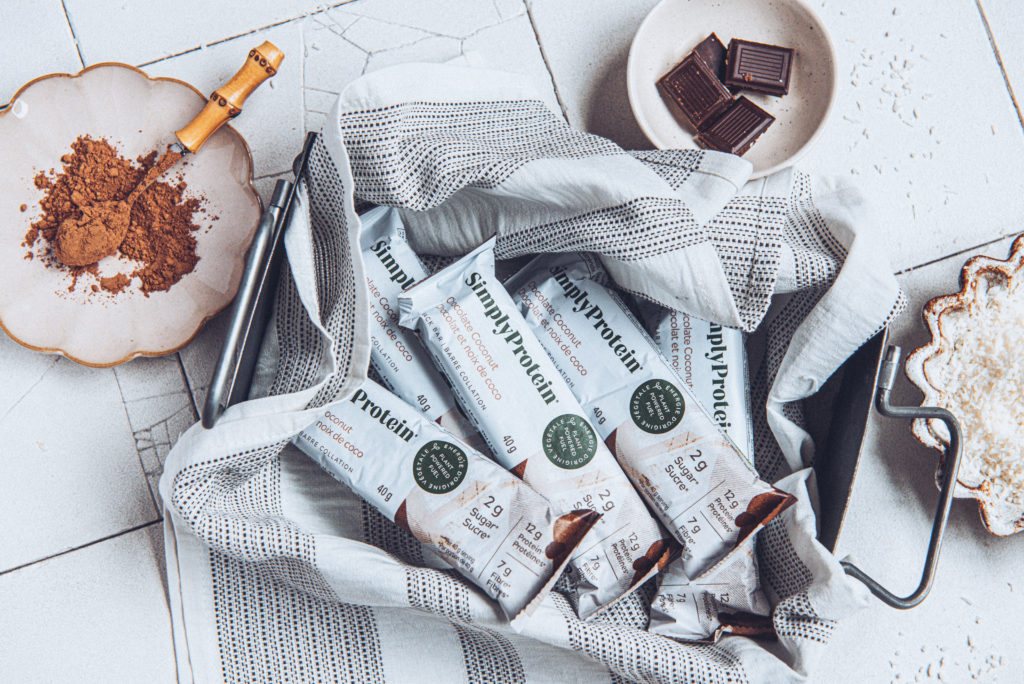SimplyProtein has been in the plant-based snacking space for over 17 years, but today, Michael Lines, the president and CEO of SimplyProtein, has found new ways to bring it back to life. The company has reinvented itself and its positioning in the market as a product to provide consumers with “plant-powered fuel.”
 Xtalks spoke with Lines about his involvement with SimplyProtein and how he has changed and adapted this company to the current times and trends.
Xtalks spoke with Lines about his involvement with SimplyProtein and how he has changed and adapted this company to the current times and trends.
SimplyProtein, originally called The Simply Bar, was founded in 2002 by a woman named Cathy Richards, and it was born out of necessity at the time. She had some dietary restrictions, and when she looked in the market for products that accommodated her lifestyle, she didn’t find any that satisfied her needs. This is why she created a plant-based, vegan, gluten-free and dairy-free product during a time when this was not very common.
In 2017, Richards sold her company to Simply Good Foods Company, who also own Atkins and Quest. Lines started working with SimplyProtein during that time; then, in 2020, Wellness Natural Inc. the company founded by Michael Lines, completed an acquisition where SimplyProtein was able to be a standalone business.
“When the investors and I bought the company, one of the opportunities we knew we needed to tackle was a reinvention. So, it’s no longer okay just to have a low-sugar protein bar. You need to find a way to break through with consumers in a different way. And you want to do these reinventions when you don’t have to do it, but you have to move forward and look at the opportunity,” Lines says.
The Three Tracks to Reinvention for SimplyProtein
To accomplish the reinvention, the company embarked on three tracks, Lines explains. The first one was product formulation. The second track was the reinvention around the brand, which hadn’t been focused on much in the past.
“We knew we had to reposition the brand, but also be much clearer with the consumer around our plant-based product. We’re clean, we have the right amount of protein and low sugar, and we wanted to make the brand a bit more approachable and more lifestyle-friendly as well as being plant-powered fuel for all. So that’s our tagline,” he adds.
The company did a lot of research into understanding consumer insights and each consumer’s unique protein needs. This is because protein is required by more than just athletes, but also the average consumer.
The third track that Lines mentions as part of the reinvention was recreating the brand’s values, culture, and purpose because they are now a standalone company and not part of a larger organization.
Related: SquarEat Gives New Meaning to Concept of Eating Three Square Meals a Day
How Important is the R&D Process in Reformulation?
SimplyProtein went through an extensive R&D process where they quantitatively researched the market and consumer preferences to alter the current formulation of the product. Then, they asked a thousand consumers to try the product, review the brand and its concepts, resulting in feedback that filled in the gaps.
Questions regarding the levels of protein, sugar, taste and texture were asked that sparked the need to reformulate the product. The brand is known to have a lighter and crispy texture, but they didn’t always have extras in their products. Now, they’ve added peanuts, chocolate chunks and more to accommodate those consumer wants.
“I think the one other thing I would say with R&D is we used that research to inspire us and inform our innovation strategy,” Lines says.
“We’ve hired a dedicated innovation manager who also has a food technician working for her. And they’re now starting to create a strategy for us around alternative snacks and potentially other meal occasions that we want to tap into that work within the SimplyProtein brand, and the rebranding and insights around protein for everyone and anybody,” he adds.
Who is SimplyProtein’s Biggest Demographic?
The company’s search for change made them understand who the real consumer of SimplyProtein is. Other than vegans and active consumers, the company learned that there is a much larger male cohort interested in the brand.
Additionally, the consumer is a mindful snacker and has an active lifestyle. Lines describes the active consumers not as people that are doing high-endurance races, but instead are engaging in yoga a few times a week.
Moreover, SimplyProtein targets not just adults, but children, which differentiates them from other plant-based protein bar companies. The kid’s product line has been around for over five years, and it is popular within its portfolio.
Having a low-sugar snack is popular for adults and parents purchasing products for their kids. Children also need more healthy products that are low in sugar and have the right amount of protein in them, and SimplyProtein targets these needs.
“Moms want to be able to give a snack to their kids on the way to soccer or just after soccer, or maybe on the way to hockey. We hear a lot from moms where they’ve got these products in their kid’s hockey bags and gym bags. It’s hard to find the right macronutrient profile in a kid’s product,” Lines explains.
However, when marketing children’s products, it’s less popular to categorize them as plant-based. So instead, SimplyProtein brings attention to the fact that its products are peanut and tree nut-free and low in sugar.
“That’s the wonderful thing about innovation and these types of categories — not just with us, but with many of the other brands — constantly reinventing and looking for different ways to bring lower-sugar options to the market,” he continues.
Should Entrepreneurs Enter This Competitive Snacking Category?
Being in the plant-based protein snacking category is a very saturated and competitive market. Lines sits on the advisory board for Plant-Based Foods of Canada, where they focus on mentoring and providing entrepreneurs with insights into entering this competitive category.
Lines provide others with some advice: firstly, knowing what you are trying to solve for the consumer. “Having just a great tasting product with wonderful packaging and a nice formula isn’t enough. You need to be solving a problem for the consumer,” he explains.
Next, one must know how their product fits in the market and showcase their point of difference.
Lines says, “You’ve got a product concept, you’ve even formulated it, you’ve been in the lab, you’ve worked on it and you’ve developed it. [But] you must be open to the idea that it’s likely not right.”
“[As a] matter of fact, it’s rarely right the first time, and some founders and entrepreneurs, myself included, get emotionally attached to these things, and they become like our children. And in fact, you’ve got to detach the emotional side of it. You have to question if this is a product that’s going to be differentiated and be ready to modify formulas, modify the brand strategy, the packaging, the narrative, all those kinds of things,” he adds.
For SimplyProtein, their next steps include further developing their e-commerce channel — that gained significant interest during the COVID-19 pandemic — and looking into future innovations.
Lines concludes by reiterating a quote he heard on a podcast the morning of our interview: “If you were born in the 1900s and you had a set of knowledge, you could maintain that knowledge for your entire career and you would retire with that one set of knowledge. But now that amount of knowledge can be gained in a weekend, right? That’s an extreme example, but obviously, it’s a reminder of staying consistently aware of the need to reinvent, the need to pivot and listening to consumers.”












Join or login to leave a comment
JOIN LOGIN